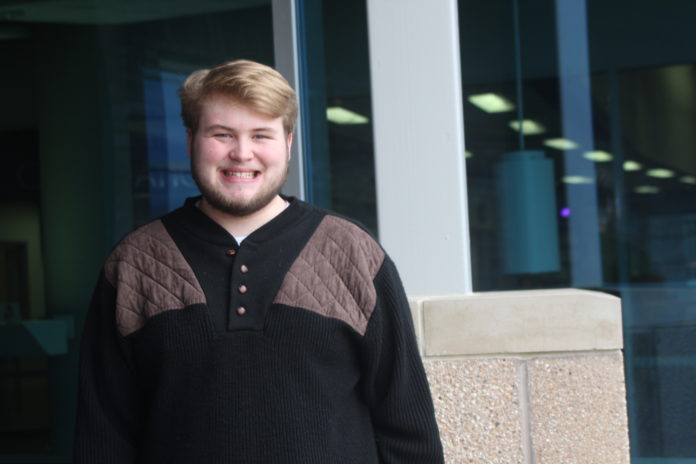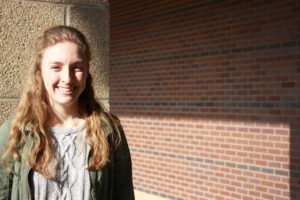
Story by Hailey Paulson
There are a few students in the halls of West that could transfer to the halls of the Capital.
A politician is a career not often thought of, however it is needed for the democracy to survive. The office of a politician can be very local as well. Mayor Randy Rhoads of Lee’s Summit finds being a politician to be full of changing circumstances.
“One of the interesting aspects of being a politician is that every day is different, issues change, people change, situations change,” said Rhoads. Specifically located in the debate room, there is an awareness of a possible future in politics for junior Maggie O’Connor.
Another avenue for political interest lies in Youth in Government. O’Connor is also involved in this program which gives students a taste of government in the state level. History teacher Rhonda Ireland leads the program and instructs those in the program.
Ireland is able to introduce students to real world government. Ireland said that “the whole concept that democracies work and for it to work we all have a part that we have to do and we need to be active for the common good.”
Another objective that Ireland teaches is the importance of getting involved with your local government. “This idea of getting involved at a local level and what that can do for you. That’s part of giving back to your community and if you don’t have people doing things like that then our democracy will take a very different look. You have to have people willing to be those public servants.”
Ireland believes that a difference can be made now. “It’s not always running for office that you can make a difference and you can further our republic,” said Ireland.
Mayor of Lee’s Summit, Randy Rhoads has experience with politics and explained that politics opens the door to the public eye on a politician’s actions. “One significant sacrifice is that you are a ‘public’ person. You always have to be aware that people are aware who you are…public exposure can be a problem for people that value their privacy,” said Rhoads.
Even in a relaxed setting, Rhoads has found that he is still being observed for his actions. “Recently, I went to a local grocery store and was making a purchase and the clerk finished by stating “Thanks, Mayor”. I did not know that person at all and it reinforced that people observe your actions,” said Rhoads.
O’Connor has found an interest in politics as a career pathway especially after debating in the event of foreign topics. This exposure to foreign affairs was not the first time O’Connor had witnessed current events worldwide.
The Debate class at West was the motivator for O’Connor to pursue politics. “I really like foreign policy the best, so if I could pick any position in government it would be probably something in the State Department,” said O’Connor.

O’Connor narrows her interests to Middle Eastern countries. “Usually if you work in the state department you pick one area that you are interested in… I am probably leaning towards Middle Eastern foreign policy, so just doing things like Israel foreign policy or resolving a lot of the civil wars that are in that area,” said O’Connor.
Another debate student found politics to be a possible career, however his love for debate did not found his call to politics. Senior Andrew Greer decided to become involved in politics due to the last election.
“The election really got me involved. One of the people who got me really involved was Bernie Sanders, not because I completely agree with everything he stands for or any of his policies,” said Greer.
“Bernie Sanders made me feel as if I could do something, that I could have an impact on the things that I saw that were wrong in the government.” The lack of participation in government is something Greer sees as a problem due to lack of education regarding the power of politics.
“There is such a huge disconnect between people and politics….People often go towards certain politicians and certain candidates because they feel like they are going to do the best jobs but that is before they’re educated well enough,” said Greer.
One of Greer’s goals is to eliminate a lack of education about politics to people and emphasize how politics can be used to solve social injustices. “What I really want to do as a politician is teach people how it applies to everyday life,” said Greer.
Each of these two young politicians have planned ways to work into the political system. O’Connor finds that she will probably narrow her education to help propel her into the political world. “If you do more like state department things, all of that is appointed basically so it would really be more like moving to D.C….or just trying to get an advanced degree in a specific foreign policy area, “ said O’Connor.
Greer plans to work locally first and then work his way to a national level. “I definitely want to start at a more local level. I think a mayor of a decent sized city, let’s say like the mayor of Springfield. I think that would be a great place for me to be,” said Greer.
One of the reasons why Greer is interested in Springfield is modeled after Mayor Sly James. “I looked at what the mayor of Kansas City did over the last couple years and I think that it’s something I could do very well,” said Greer.
The future O’Connor sees in government is slightly different as she is looking towards the State Department. “It’s a lot more about working in that area and becoming an expert than getting elected which is more appealing to me then having to go through the whole election process,” said O’Connor.
“I just think you get less done and you are focused more on making sure your decisions are politically acceptable… As opposed to if you are working on foreign policy and someone has appointed you, then you can really focus on the issues and the political implications.”
O’Connor believes most of this is rooted in the lack of public attention to the work done compared to an election. “It has less to do with you personally. Especially if you’re not the head of the State Department. If you are in a more behind the scenes position you can really get more work done because you are not in the public eye or worrying about public opinion,” said O’Connor.
Both students hope to accomplish different policies in different areas of politics. Greer is more focused on domestic policies while O’Connor is focused on foreign policies and affairs. One of the places that Greer would start in is the art of compromise.
“I feel like there is too much fighting and we are not trying to find any common ground. That’s what I want to do… We are better as a country and I feel like we can definitely get back to the things that made this country so great in the first place,” said Greer.
Education is among the top priorities of Greer’s and he hopes to make college a free opportunity for everyone.
“America prides itself on being the land of the free and we all have equal opportunity but if you don’t give everyone that skipping stone to go for it, it’s not fair,” said Greer, “another platform I have is decriminalize all drugs and federally legalize marijuana.”
Greer support this idea based off of the success in Colorado with the legalization of marijuana and believes the money from the organizations against marijuana could be beneficial for other purposes.“If you could use that money for what you use on the DEA and all this other kind of nonsense that isn’t working, you could create rehab facilities for drug users or atics,” said Greer.
The difference between legalizing and decriminalizing for drugs other than marijuana is not to be confused. “There is a difference between decriminalizing and legalizing drugs…Decriminalizing is saying ‘If the law enforcement catches you they are going to take it away, you will maybe get a fine but you are not going to go to jail for the rest of your life,” said Greer.
On the other hand in foreign affairs, O’Connor wants to focus on basic rights she finds are denied in several areas of the world. “If I could accomplish anything, I guess diplomatic wise, would be women’s rights…. I think Saudi Arabia, since we are such good allies with them, there is a lot of potential there and there are a lot of good openings for women’s rights in that country,” said O’Connor.
The women’s rights present in America encouraged O’Connor to look to other countries to establish the same rights. “When I think about people, not just in the Middle East, but all around the world who don’t even have basic human rights or specifically women’s rights compared to some of the things we worry about here, I feel like someone needs to advocate for those people.”
A Mayor has many people he needs to advocate and represent. One of the ways that Rhoads has found to fix problems that the public introduces to his attention is listening.
“The ability to be an active listener allows one to be gather information that will help them formulate a solution. This can be a challenge, because often a politician thinks they know the ‘answer’ to an issue and quickly becomes aware that their position may not be the most desirable,” said Rhoads.
These policies and ideas are just the beginning for these aspiring politicians. Greer himself goes back to where he started with politics as he heavily questioned the government and whether or not it was fit to fight for.
“Why I want to get involved is because I see a broken system and whether or not I truly believe whether that system will implode on itself, whether or not I think the foundation is to the point or not that it can be salvaged, I think that the best you can do is try,” said Greer.













